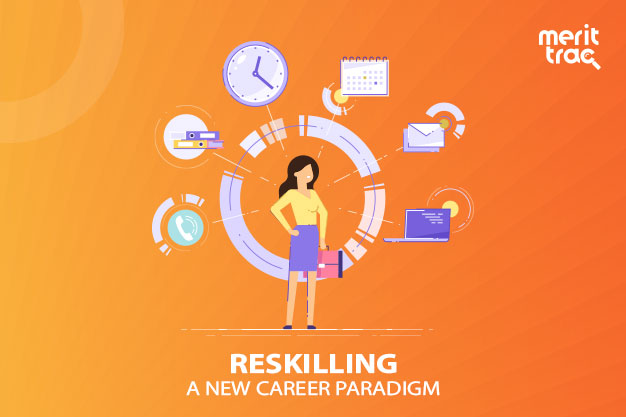
Reskilling – A New career paradigm
Date: 09/01/2020 | Posted by: Mansij Majumder, HR Head | Category: Corporate , Employability Skills
“Your organization is moved by the skills that you have. The evolution of individuals in a company ultimately translates to the evolution of a company.” -Matthew Sigelman CEO of Burning Glass Technologies
In the year 2000 when I joined one of the preeminent engineering colleges of India, my (and most of my batchmates’) thoughts were on getting a job in a good company. Good company being college speak for one which has been around for a while, is profitable and has an assured growth path. A good job in a good company was a defining value statement for individuals, families and the society at large. The situation had not changed much after about 5 years, when I joined the PGD program at one of the premier B-schools of India. Here individuals were even more focussed. People knew exactly which consulting, I-banking, FMCG company they wanted to join. The two years, was all about case study after case study of businesses successfully transforming themselves, placement committee negotiating with companies for placement week, and individuals going to great lengths to land their dream, “settled jobs”. And here I was, who didn’t exactly know the difference between McKinsey and McDonalds (yeah, I know the look!!). Though in the long run, I realize that 90% of my batch had changed their dream jobs, within the first two years.
20 years later, the process of getting a job hasn’t changed dramatically. One still has to go through the hoops of applying, getting shortlisted, showcasing one’s mettle and then actually getting the job and performing. What has changed is the societal mind set and the philosophy of how jobs are viewed by the applicants, employers and the society at large.
Today, jobs are being commoditized and there is higher emphasis on skills than ever before. Organisations are moving away from employment for life, to hire now and hit the ground running. This is challenging the way in which talent is sourced, hired and formed into teams. Every year, we are also looking at significant disruption in the job market – every year skills which were niche a year before are becoming mass market, capabilities that didn’t exist are being sought after. Ola is looking for a “direct procurement managers”, a role that didn’t exist outside the auto OEMs even a few years back. Amazon is hiring “culinary product developers”, which I am not sure existed as a role even a year back. There seems to be an explosion of never known before jobs, titles and positions. This is a market place of opportunity and at the same time of obsolesce of traditional jobs. People who will be ahead of the curve are the ones who have a higher learnability – ability to pick up newer skills and competencies. In this world, your education doesn’t matter – you could be a doctor with a MBBS degree, but working in developing the next generation cardiac monitor which takes input from your iPhone - this is the new ‘skills economy’, nothing but your skill matters.
One of the favourite questions asked in interviews in the 2000’s, was “where do you see yourself five years from now”. Today this question, and maybe even the concept of job interviews, are redundant. In this VUCA world, we will see individuals planning for shorter career horizons. Tenures in organizations will be shorter, unless the organisations provide platforms for employees to continuously reskill and upskill themselves, and also provide opportunities for employees to pivot into completely new roles with new skills.
This focus on skills and shorter career horizons, will require people to develop multiple deep skills in the medium term. The edutech world is trying to solve this problem. But what would also be required is a certification or assessment agency that lets individuals rank their skills – an equivalent of Microsoft’s TrueSkill® for the job world. An individual’s performance is not only dependent on his/her skills, but also on the organization environment and team structure. Is there a way to measure or predict how a person would perform across different organizations? Is there a way to predict what skill level will be ideal for a particular organization? We have multiple examples of high performers in a particular organization failing to make their mark in a new organization. It is normally not only a question of adapting ones skills in the new organization, but also of adapting to the environment and support structure present or absent in the new organization. Another important but ignored factor is the life stage of the individual. TrueSkill® equivalent will enable both the job seeker as well as the organization identify the right fit, and probably reduce the number of wrong hires/experimental hires that an organization goes through.
In the coming few years, we will want to see the answer to this. Maybe the 2020’s will give rise to a unified skill matrix leading to a true ‘age of skills’.












 Sales Hotline: USA: +1 646 916 0939 / Others: +91 80619 14700
Sales Hotline: USA: +1 646 916 0939 / Others: +91 80619 14700


